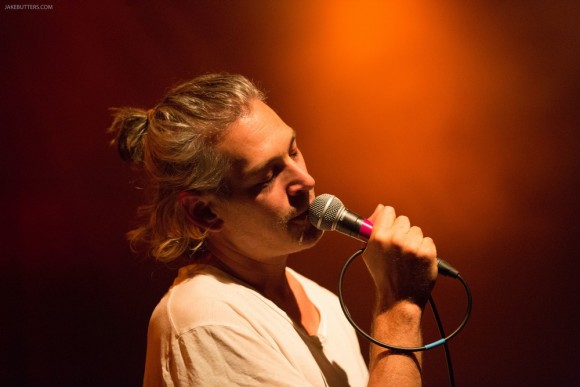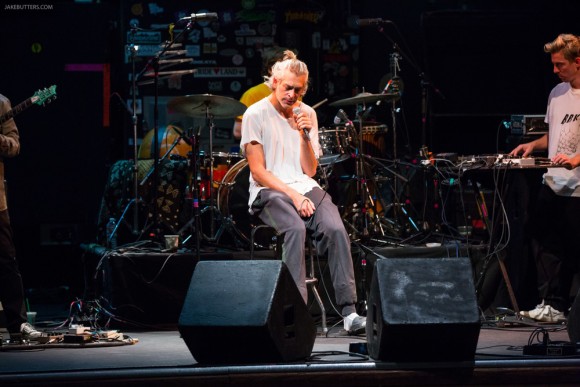Contact CU Independent News Staff Writer Isaac Siegel at isaac.siegel@colorado.edu.
“Big.” That is how the spiritual, Judaic reggae and hip-hop inspired artist Matisyahu described himself in one word. And big he was. The 6-foot-4 New York City native carried himself with a sense of grandiosity as he took the stage this past Sunday night. Prior to performing an “intimate” show, as the title of his current tour suggests, Matthew Miller and I sat down to discuss subjects ranging from the current influence of his live band to why he decided to drop out of high school and follow Phish around the country at the beginning of his senior year. Take a look at the interview below – you may be surprised by the transformative story this Jewish musical icon is still writing.
How would you describe yourself in one word?
Big.
How is this going to be an intimate evening with Matisyahu, more so than other shows?
Well, it’s a small venue and the music is dynamically more intimate.
Will you be playing older music? Newer music?
We released a Live at Stubbs vol. III so that includes a lot of the older songs we’ll be playing. But, we do a lot of the newer songs off Akeda as well because they fit pretty well for this setting and this particular band that I’m playing with. The band now is the original guitar player, Aaron Dugan, who started with me and went to college with me – we started a band together at the New School in Manhattan Village. We’re playing with a drummer named Tim Keiper, who I’ve never toured with before, but who was also at the New School with us. He went on and did a lot of African Inspired percussion; he worked a lot with John Zorn and was a part of the “downtown scene” in New York – very jazzy. He’s an interesting percussionist but also plays kit. So when I started to want to do these shows as an intimate type of thing, I thought it would be good to have a percussionist as opposed to a drummer. We ended up using the drums a lot. I do a lot of beat boxing in the show – more so than the typical Matisyahu show. I incorporate it into the sound a lot. And then Rob Marscher is playing with me. He toured with me for a few years and then spent the last several years with Jen Hartswick from the Trey Anastasio Band. Stu Brooks is the bass player that’s been with me for the last five or six years – he plays with the Dub Trio. So the show, I think you’ll see, is pretty interesting – a new thing and an interesting mix of sounds, very influenced by Phish in the sense of improvisation – we like to improvise.
About the music festival in Spain this summer: what made you hesitant to publicly discuss Israeli politics? Do you feel a responsibility to openly support Israel as a Jewish artist? Did fear for your personal safety play a role in not wanting to publicly talk about Israeli issues?
When I was asked to make a statement, it wasn’t like they were asking me my opinion of Israeli politics, they were asking me to make a political statement that I didn’t agree with. I forget exactly what the statement was they were asking me to make – it was about a Palestinian state – but I know that it made me feel very uncomfortable when I read it. It didn’t fit with my view at all, so that was why I didn’t say anything. And do I feel a responsibility to speak up for Israel? The answer is no – I do speak up for Israel now especially since I’ve gotten certain press for it, but the press came because of the BDS, because of the opposition to me. It wasn’t something that I created on its own, it happened very organically. I always have felt that actions speak louder than words. My thing has always been going to Israel, playing in Israel, I made a video in Israel, I recorded a record in Israel. I’ve always felt close to Israel but I’ve never felt like its necessarily my job to go around and try to convince people of anything with my words or statements – more through the music and through the art that I create…to have an influence that way; not for the sake of having an influence but mainly because of my own personal connection to Israel.
When you decided to drop out of high school after the first day of your senior year and travel across the country, what was going through your mind? Did music play a role in that decision?
Music definitely played a role. I knew that I loved music by that point in my life and I knew that I wanted to be involved in it, but I didn’t know the proper channel to do that. I sort of went out in a very instinctive way and followed around the band that I loved, Phish. I had the seed planted in my head early on that that was what I wanted to do – to go on tour, to go around and hear music. All the pieces sort of just fit together. I met some people, I got into some situations… I wanted to get out.
In the song Late Night in Zion you say, “A man is just a man, filled of faults and weakness, for a young Jerusalem all alone and speechless. Nighttime, nobody’s home, roam streets in darkness.” What inspired that belief?
I was actually walking around in Jerusalem, probably at 4 a.m. and the streets were very quiet. I think I was thinking about the subject of Jerusalem being in exile.
What do you mean “Jerusalem being in exile”?
After the destruction of the second temple, Jerusalem became sort of a widow. The Shechinah – the face of God or the presence of God – left. The Shechinah is a female, a female presence of God. So after the destruction of the temple when the Jews went into exile, it says the Shechinah went with them.
In the song Unique is My Dove you say, “One woman for me, other half of my soul, roots of my tree.” How do you feel about that belief given everything that has happened in your life up until now, specifically having had children with multiple women?
That’s funny, no one has ever asked me that. It’s kind of an obvious question that no one has ever asked. There’s a lot of youthful, naïve ideology in some of my earlier records – which is what it is. There’s really nothing that I’ve said that I completely disagree with. There’s a lot of things that I wouldn’t necessarily promote today if I was writing a song. That wouldn’t be an idea that would pop into my head, something like this. At the time it was a cool idea for me because it fell in line with the way that I was thinking, and that was real to me at the time that I wrote that song.
Is it kind of like a live and you learn deal?
Not even so much as you change over time. Sometimes one of the reasons that people don’t change is because they get stuck to believing a certain thing at a certain time and if they don’t believe it anymore it discredits that thing or it makes it like they were living a lie, so they just stick to the same thing. For me, I’ve been able to let go – sort of an act of humility in a certain sense to be able to leave your ideas behind and evolve as your organically change without getting in the way of yourself.
Does that connect to your change in faith and spirituality over time?
Exactly.
Check out Matisyahu’s tour schedule.



